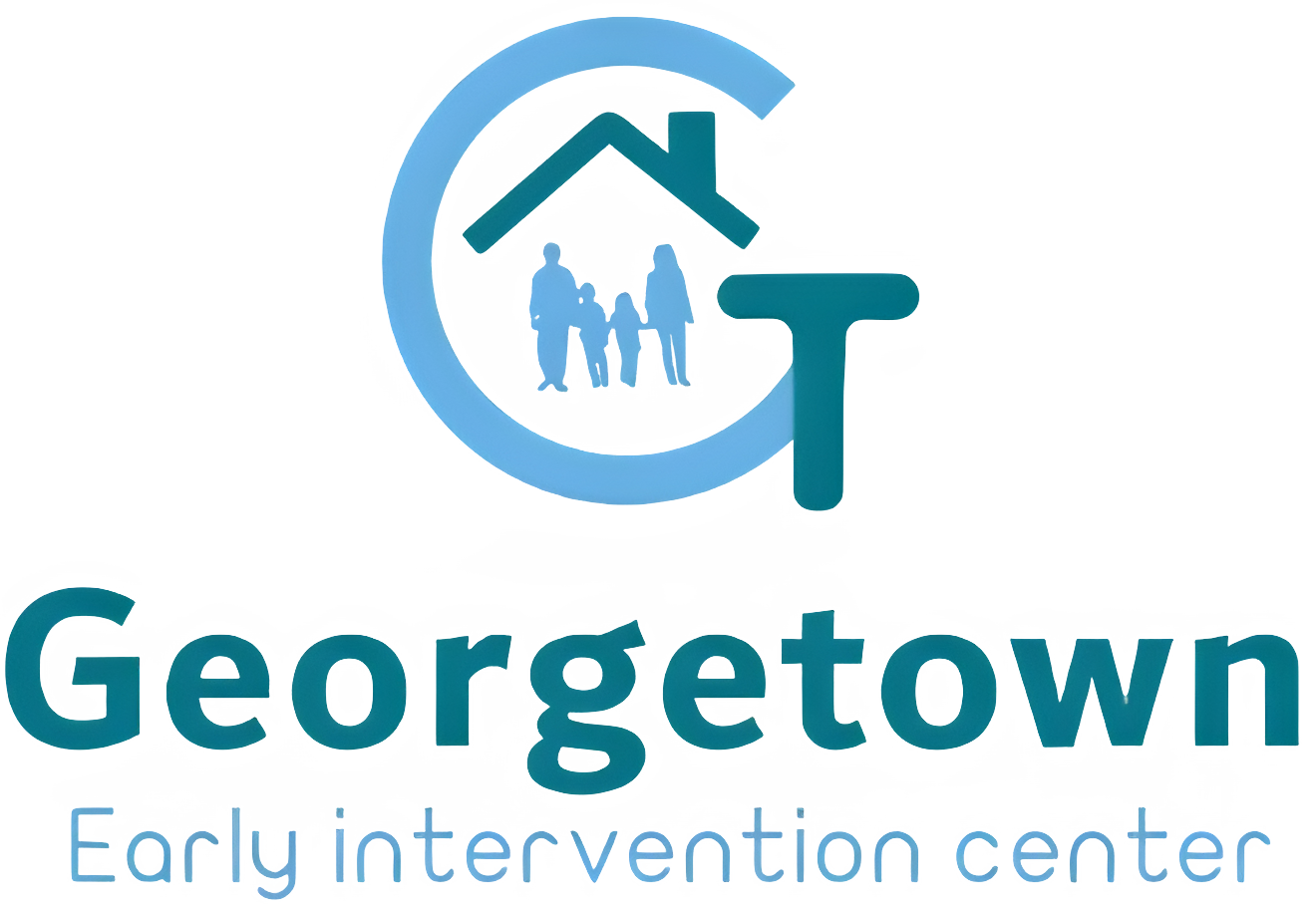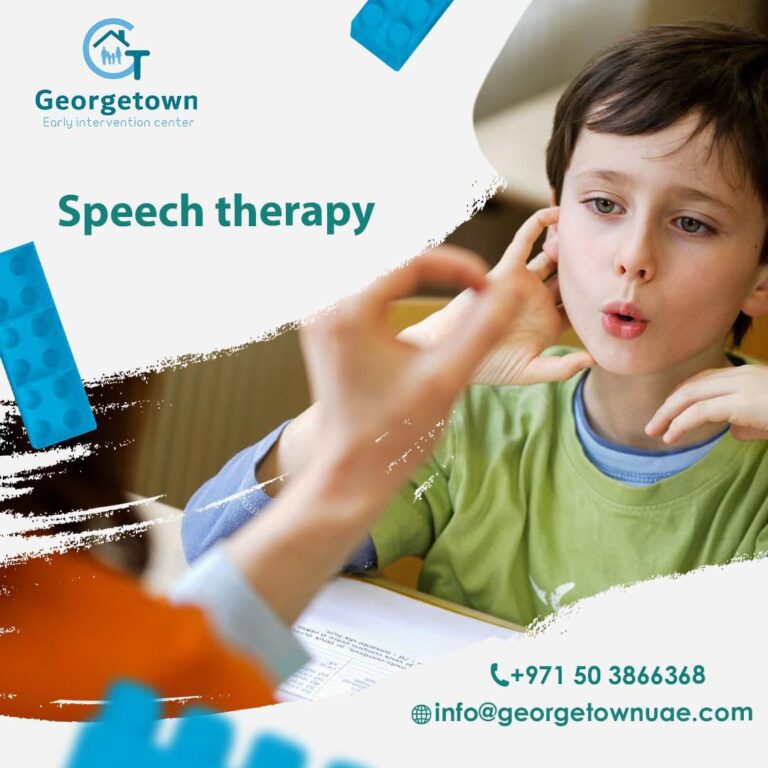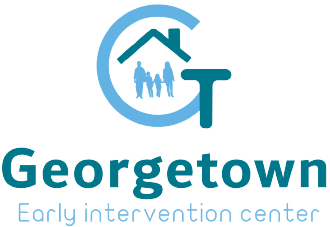When you type "speech language pathology near me" into a search bar, you're usually looking for more than just a list of names. You're searching for a guide, a professional who can help you or a loved one navigate a communication challenge.
A Speech-Language Pathologist (SLP) is a lot like a personal trainer, but for the incredibly complex skills involved in speaking, understanding, and even swallowing. Their job is to zero in on specific difficulties and build a supportive, effective plan for improvement.
Starting Your Search for Local Speech Therapy

The journey to finding a speech therapist often starts with a single concern. It might be a parent worrying that their toddler isn't forming words like other kids their age, or an adult who notices their voice has changed since a recent illness.
That initial question—that moment of concern—is the most important first step. It’s when you decide to seek expert guidance to improve communication skills, whether for yourself or someone you care about.
Recognizing the Need for Support
Pinpointing the need for an SLP is where it all begins. The reasons people start this search are incredibly varied and often deeply personal.
Take a look at these common scenarios:
- For a Child: A teacher might mention that a student is having trouble with certain sounds, making it hard for classmates to understand them.
- For an Adult: After a stroke, someone may struggle to find the right words, a condition known as aphasia.
- For a Professional: A singer or public speaker could start experiencing vocal strain and hoarseness that puts their career at risk.
Think of an SLP as more than just a therapist; they're a dedicated partner. Their goal is to understand your unique communication landscape and give you the tools to navigate it with confidence.
Each of these paths leads to the same place: the realization that professional support can make a world of difference. Understanding these triggers helps clarify why finding the right local SLP is so important.
What a Speech-Language Pathologist Actually Does
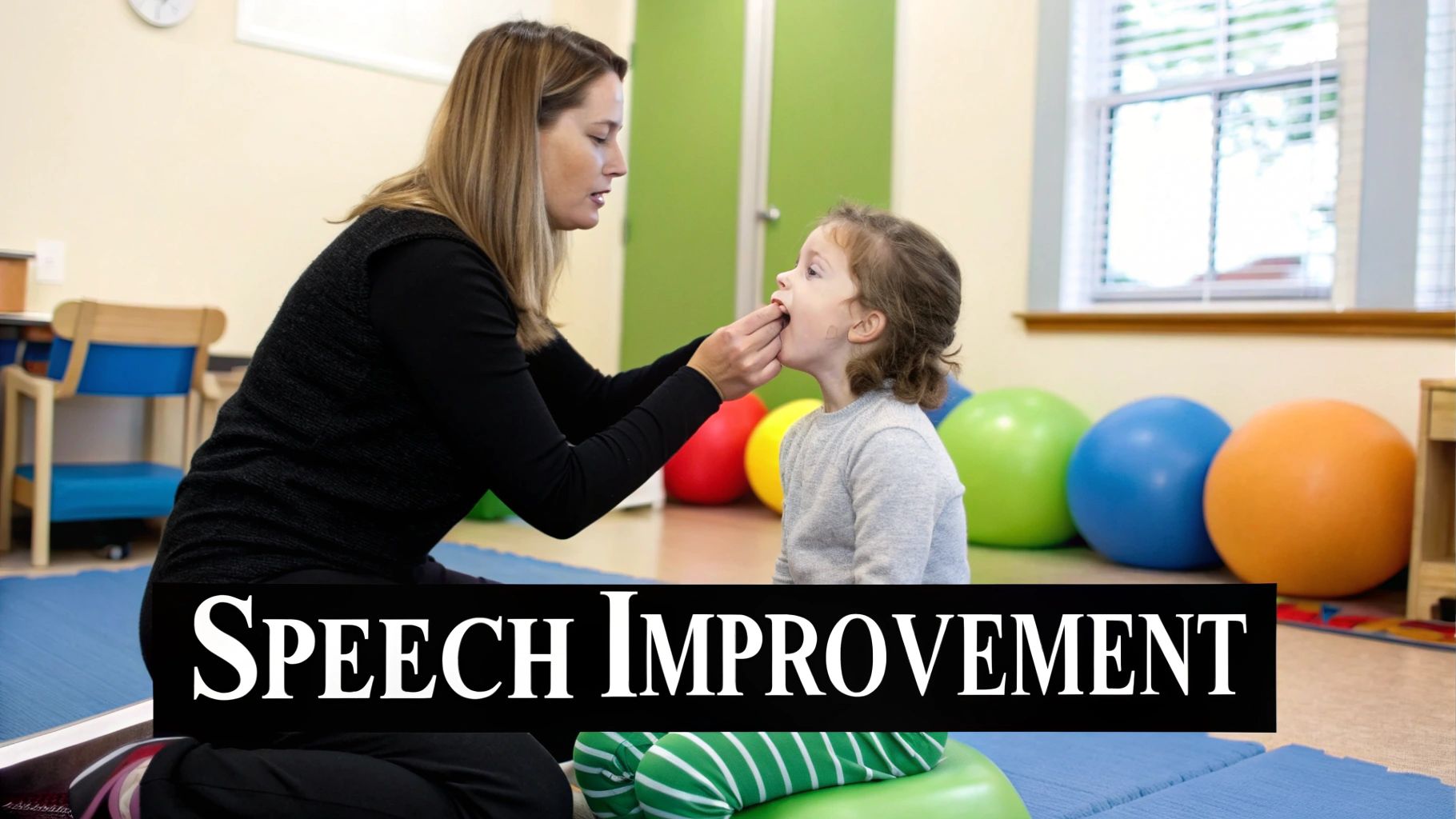
When you hear “speech therapist,” you might picture someone helping a child with a lisp. That's part of it, but a Speech-Language Pathologist (SLP) does so much more. Think of them as communication detectives and personal coaches rolled into one. They get to the root of a challenge, then build a personalized game plan to help their clients build skills and confidence.
Their work covers an incredible range of ages and needs. One day, an SLP might be helping a toddler connect sounds to say their first clear words. The next, they could be working with a professional singer to heal and protect strained vocal cords. This versatility is what makes their role so vital.
A Look at Real-World Impact
The support an SLP provides isn't abstract—it's deeply connected to everyday life. For families searching for "speech language pathology near me," this expertise translates into real, meaningful improvements.
Here are just a few scenarios where an SLP makes a critical difference:
- For a Teenager: They can teach a high school student strategies to manage a stutter, giving them the tools to speak more fluently and confidently during class presentations.
- For an Older Adult: After a stroke, an SLP can work with a senior to regain safe swallowing functions (dysphagia), making meals safer and bringing back the joy of eating.
- For a Child with Autism: Using play-based approaches, they can help a child understand non-verbal cues and enjoy back-and-forth conversations with friends and family.
This need for skilled communication support is growing worldwide. The speech pathology services market was valued at USD 4.59 billion in 2022 and is projected to grow steadily, with the Middle East and Africa showing increased awareness. You can dive into the full market analysis on The Brainy Insights.
At its core, an SLP’s job is to empower people. They provide the tools and strategies needed to connect with others, express thoughts clearly, and participate fully in the world around them.
Whether it’s helping someone find their voice or ensuring they can safely enjoy a meal, their impact is profound. These skills are essential for helping people of all ages overcome barriers and achieve a better quality of life.
Who Benefits From Speech Language Pathology?
When you find yourself searching for "speech language pathology near me," you probably have a specific concern in mind, either for yourself or someone you care about. What’s incredible about this field is its sheer breadth—it supports people at every stage of life, from toddlers just learning their first words to seniors working to maintain their communication skills.
Communication challenges are far more common than most people think. In fact, about 8–9% of young children deal with speech sound disorders, and by the time they reach first grade, 5% have noticeable speech disorders. These aren't just numbers; they represent kids in our communities who could use a little extra support. If you're curious about the data, beaminghealth.com offers a deeper dive into speech therapy statistics.
Support Across Every Stage of Life
A speech-language pathologist (SLP) doesn’t have a one-size-fits-all approach. Their expertise is in adapting their methods to meet the unique needs of different age groups, whether they're working with a child, an adult, or a senior.
The table below breaks down some of the common conditions an SLP can address across the lifespan. It's a quick way to see how this kind of support can make a difference at any age.
Common Conditions Treated by Speech Language Pathologists
| Age Group | Common Conditions Addressed | Example Scenario |
|---|---|---|
| Children & Toddlers | Articulation disorders, language delays, stuttering, social communication (e.g., autism) | A four-year-old struggles to pronounce the 'r' sound, making it hard for friends to understand them at preschool. |
| Adults | Aphasia (post-stroke/brain injury), voice disorders, fluency issues (stuttering) | A teacher experiences voice strain and hoarseness after years of projecting in the classroom. |
| Seniors | Cognitive-communication issues (dementia-related), dysphagia (swallowing difficulties) | An older adult who recently had a stroke finds it difficult to swallow liquids safely, posing a risk of choking. |
As you can see, the work of an SLP is incredibly varied but always focused on helping people connect and function better in their day-to-day lives.
The goal of speech therapy is always practical: to build skills that make daily interactions easier, clearer, and more enjoyable. It's about empowering individuals to connect with the world around them.
Whether it’s helping a child finally say their name clearly or ensuring a grandparent can safely share a meal with their family, an SLP provides essential, personalized support. Their work is all about making sure communication barriers don't get in the way of living a full and meaningful life.
How to Choose the Right SLP in Your Area
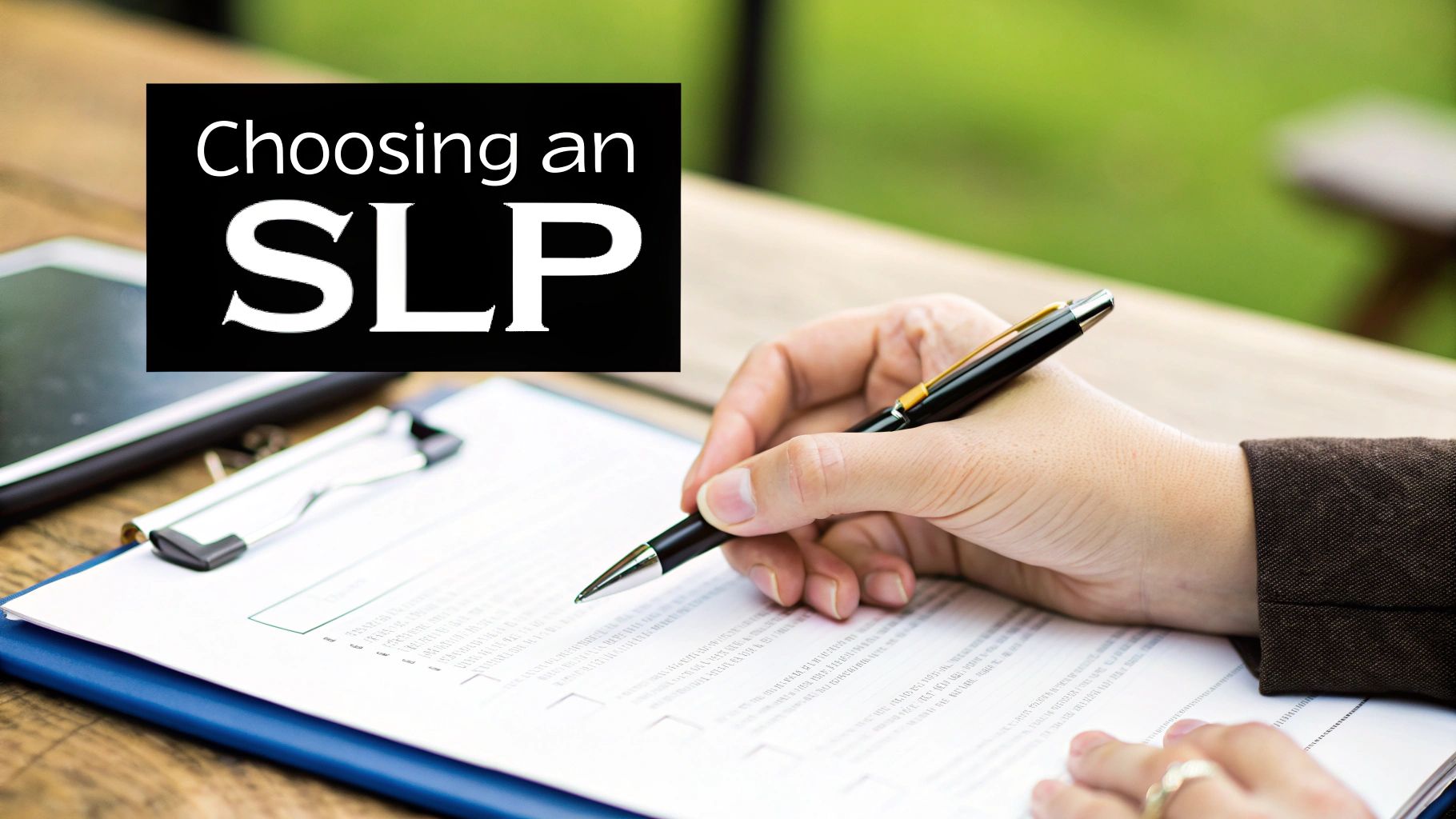
Searching for "speech language pathology near me" will give you a list of names. That's the easy part. The real work is finding the right professional who truly understands your family's unique situation and can build a genuine connection. This isn't a decision to take lightly—the right therapist can make all the difference.
Think of it like finding a guide for an important journey. You need someone with a reliable map (their qualifications), the right gear for the terrain (their specializations), and a personality that makes you feel confident and supported every step of the way.
Verifying Credentials and Specializations
First things first, you need to make sure any potential SLP has the right credentials. These aren't just letters after a name; they represent a high standard of professional expertise.
- Essential Qualifications: A master's degree in Speech-Language Pathology is non-negotiable.
- The Gold Standard: Look for the CCC-SLP designation. This stands for the Certificate of Clinical Competence from the American Speech-Language-Hearing Association (ASHA) and is a mark of a highly trained professional.
- Local Licensure: They must be licensed to practice in your state.
Beyond the basics, dig into their specializations. SLPs are a lot like doctors in that they often have specific areas of focus. One might be an expert in pediatric feeding and swallowing, while another shines in helping adults recover their speech after a stroke. Don't be shy about asking if they have deep experience with your specific concerns.
Key Questions for Your Consultation
The initial consultation is your chance to interview them. Remember, it’s a two-way street. While they are assessing your needs, you should be assessing whether they are the right fit for you or your child.
The right therapeutic relationship is built on trust and rapport. A skilled SLP is not just a clinician; they are a coach, an educator, and a partner who empowers you to reach your goals.
Walk into that first meeting prepared with a few questions to get the conversation started:
- What’s your experience working with [mention your specific condition]?
- How do you typically involve parents and family members in the therapy process?
- Could you describe what a typical therapy session looks like for these kinds of goals?
- How do you track progress and decide when to adjust the therapy plan?
Finally, trust your gut. Effective therapy depends heavily on a strong, trusting relationship. Look for the SLP who not only checks all the professional boxes but also makes you or your loved one feel heard, respected, and motivated.
What to Expect From Your First Speech Therapy Sessions
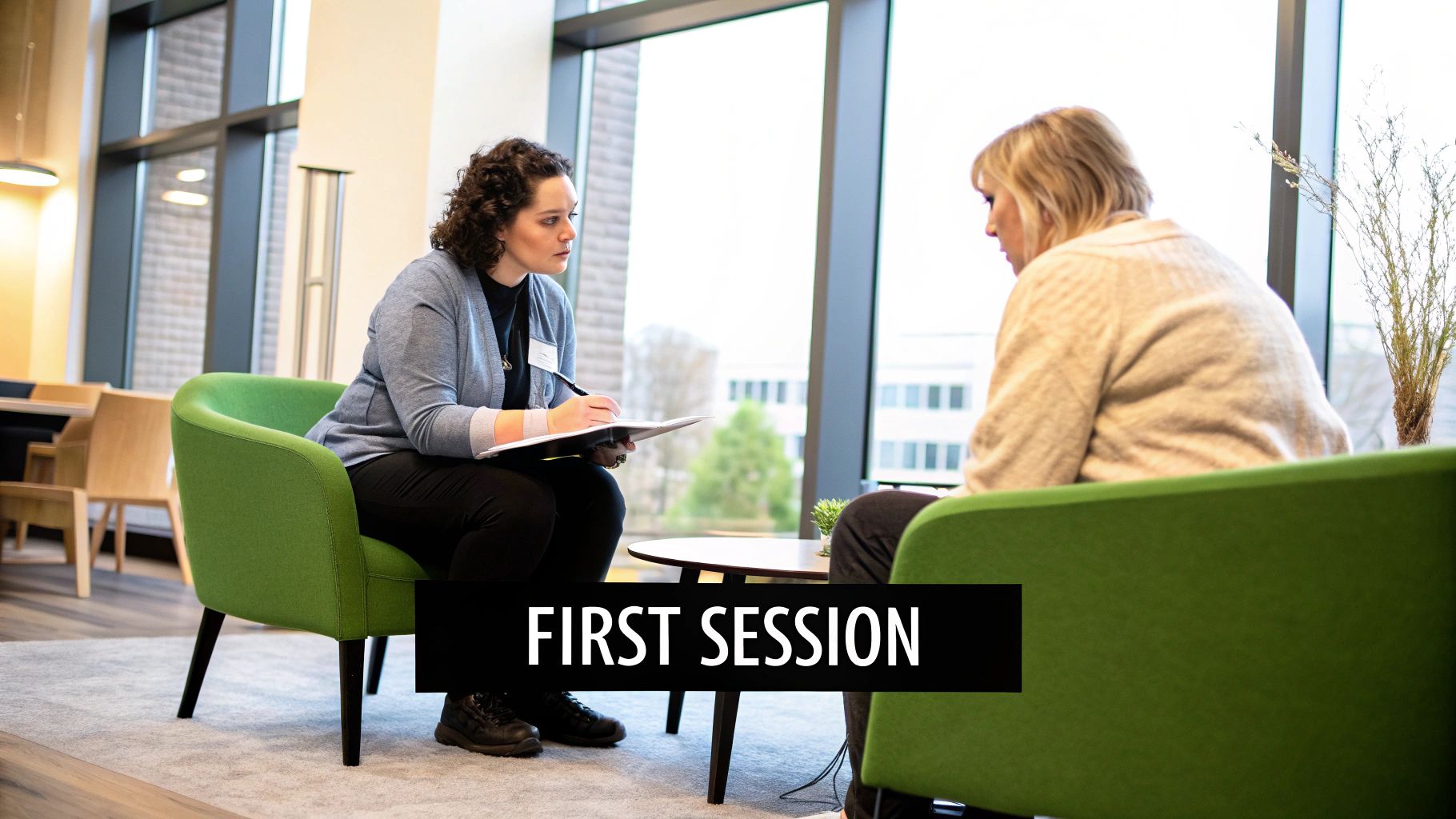
Starting with a new therapist can feel a little mysterious. What’s going to happen in that first appointment? What are the sessions actually like? Rest assured, the entire process is designed to be supportive and collaborative from day one, starting with a clear roadmap built just for you or your child.
Think of that first meeting as a get-to-know-you session. This initial evaluation is all about the Speech-Language Pathologist (SLP) getting the full picture of your communication strengths and the areas where you need a little help. It’s a comfortable blend of conversation, observation, and sometimes a few structured activities.
The Initial Evaluation Process
During this first appointment, the SLP gathers all the information needed to build a plan that truly fits. It feels less like a test and more like a detailed conversation to map out the best path forward for you.
Here’s what you can generally expect:
- A Detailed Discussion: You’ll have a chance to share your concerns, go over relevant medical history, and talk about what you hope to achieve through therapy.
- Gentle Assessments: The SLP will use age-appropriate methods—like fun games for a child or specific conversational tasks for an adult—to see communication skills in action.
- Setting Initial Goals: Based on everything they learn, the therapist will suggest some starting goals and walk you through their recommended approach.
The first session is all about building a partnership. A great SLP listens carefully to your concerns and makes sure you feel comfortable and understood from the very beginning.
Your First Few Therapy Sessions
Once the evaluation is complete, the real work begins—but it often feels more like guided practice or even play. Your therapist will use the goals from your plan to design each session.
For a toddler, a session might look like playing with toys to encourage new sounds. For an adult recovering from a stroke, it might involve exercises to strengthen swallowing muscles. Every activity has a clear purpose.
Your SLP will create a therapy plan that is entirely unique to you. This collaborative approach is what makes finding the right speech language pathology near me such an empowering step.
Answering Your Questions About Local Speech Therapy
Even after deciding to look for help, you probably still have some questions swirling around. That’s perfectly normal. Getting clear, straightforward answers can help you feel much more confident as you take the next steps.
Let’s walk through some of the most common questions people ask when they start searching for speech therapy nearby.
How Long Does Speech Therapy Usually Last?
This is one of the first things everyone wants to know, and the honest answer is: it really depends on the person. There's no one-size-fits-all timeline for therapy.
A young child working on a minor articulation issue, like a lisp or trouble with the 's' sound, might only need a few months of consistent sessions to see great results. On the other hand, an adult recovering from a significant stroke or brain injury could find ongoing support beneficial for a year or even longer. Your SLP will map out a personalized plan with clear goals and keep you updated on the expected timeline as progress is made.
Is Online Speech Therapy as Effective as In-Person?
For many conditions, absolutely. Online therapy, often called teletherapy, has been a game-changer, proving to be just as effective as traditional in-person sessions for a wide range of goals. It offers incredible convenience, making it much easier for busy families to fit therapy into their schedules.
But the best format really comes down to the individual's specific needs. Some challenges, particularly those involving the physical mechanics of swallowing (dysphagia), often benefit more from direct, hands-on guidance. It's always a good idea to chat with a potential provider about which option they feel is the right fit for you or your child.
Your therapy plan should be as unique as you are. Whether it's online or in-person, the goal is always the same: providing effective, goal-oriented support that makes a real difference in daily life.
What Is the Cost of Speech Therapy?
The cost of speech therapy can vary quite a bit based on your location, the therapist's experience, and how long each session is. The good news is that many health insurance plans do offer coverage for speech therapy, especially when a doctor deems it medically necessary.
Before you start, it's a smart move to call your insurance provider directly. Ask them to confirm your benefits, and be sure to get specifics on co-pays, deductibles, or any limits on the number of sessions covered. You should also ask the SLP's office about their private rates and which insurance plans they accept.
Is There a Difference Between a Speech Therapist and an SLP?
You’ll hear these terms used interchangeably in conversation, but there is a professional distinction.
Speech-Language Pathologist (SLP) is the official title for a certified expert who has earned a master's degree and completed extensive clinical training. "Speech therapist" is simply a more common, informal term for the same professional.
When you’re looking for a qualified expert, keep an eye out for credentials like MA, MS, and especially CCC-SLP. That last one—the Certificate of Clinical Competence—is the gold standard, a nationally recognized mark of excellence from the American Speech-Language-Hearing Association (ASHA).
Article created using Outrank
